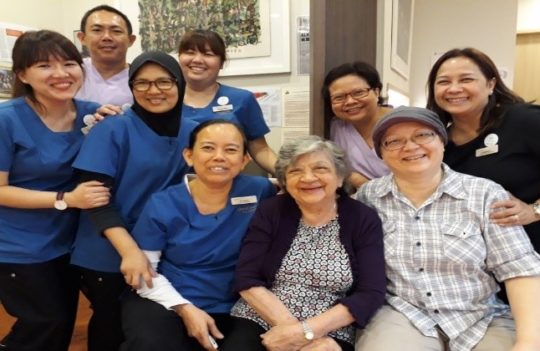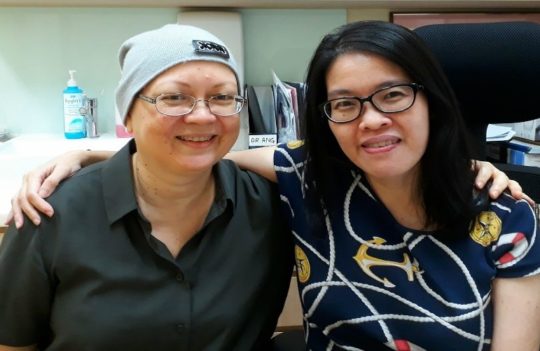SHARES

Karen is a breast cancer survivor who received treatment at OncoCare Cancer Centre under the care of Dr Tan Sing Huang. She was diagnosed with stage three triple-negative breast cancer in early 2017, and later achieved remission within the same year. Here, she brings us through her cancer journey.
Noticing the First Sign of Cancer
Weeks before Christmas 2016, Karen observed some breast discharges on her bra. In her late forties, she dismissed that it was anything serious, thinking that it could be related to menopausal hormone changes. “However, as Christmas neared, I found more stains on my bra and told my mother about it. Always the worrier, she urged me to see a doctor.”
Karen first consulted a general practitioner at a polyclinic. “After examinations, the doctor found a lump in my left breast. I could barely feel the lump myself, hence I wasn’t too worried,” she said. She was then referred to a breast clinic in a government hospital for further investigations.
Just after the New Year holiday, Karen found herself back at the doctor’s office again. “The doctor pinpointed the exact location of the lump – in the lower outer quadrant of the left breast. Feeling concerned, the doctor asked whether I could stay longer for more detailed scans, and I agreed.” The mammogram turned out normal; meanwhile, the ultrasound detected something suspicious.
“Eventually, the doctor broke the news that I have a large lump in my left breast and armpit. Thinking that my family had no history of cancer, I kept telling myself that they were just cysts. I remained in denial as the clinic arranged a series of baseline scans and tests,” she recalled painfully. “Only my mother and my sister knew about the ordeal that I was going through. My sister is a level-headed person. I was glad for her company when we collected the results of the scans and tests, as the doctor confirmed that I had stage three breast cancer!”
Preparing for Cancer Treatment
“Fate brought us to OncoCare Cancer Centre by my trusted friends, who were cancer survivors themselves,” said Karen. After an introductory consultation with Dr Tay Miah Hiang, she was referred to Dr Tan Sing Huang for cancer treatment.
Karen and Dr Tan Sing Huang (Photo credit: Karen)
“Around this time, the government hospital reverted that I had triple-negative breast cancer (a cancer that tests negative for estrogen receptors, progesterone receptors, and excess HER2 protein). In simpler terms, it was considered more aggressive than other breast cancers. In spite of that, all things considered, Dr Tan was confident that the chemotherapy would be effective,” she continued. Karen was later started on 24 weeks of chemotherapy – four cycles of doxorubicin/cyclophosphamide administered once every three weeks, followed by twelve cycles of paclitaxel/carboplatin given weekly.
“Prior to initiating chemotherapy, I underwent a biopsy-like procedure with a surgeon to insert three small metal clips. These clips mark the location of the lumps in my breast and lymph nodes – just in case the chemotherapy was successful and eradicated the cancerous growth completely,” she mentioned. “Two hours after the procedure, I arrived at OncoCare Cancer Centre for my first chemotherapy session with my sister.”
Daunting Chemotherapy Sessions & Facing Fears
“Chemotherapy was not fun. It always started with the nurses having to find a “good” vein. After that, I would be hooked to a machine that would dispense the chemicals. Usually, there would be at least four bottles hanging on the stand next to me,” described Karen.
“These medications would have odd effects, like hot flush, tingling sensation, or an unsavory taste in my mouth. Sometimes, the liquid was so cold that I could feel it flow up my arms. I was glad that none of the medications made me feel nauseous immediately. The treatments were usually uneventful, except for one occasion when I experienced allergic reaction,” she continued.
The effects of chemotherapy were not as bad as anticipated. “I always dreaded throwing up, but it never happened because I was provided with anti-nausea medications. Nevertheless, I usually ended up exhausted. Days following chemotherapy, I would feel sick at the smell of food. It didn’t help with my appetite that I also had metallic taste in my mouth.”
“I also feared losing my hair. After the first week of treatment, I noticed more hair than normal dropping onto my shoulders. When I ran my hand through my hair, it came off in clumps! Within days, my hair thinned drastically and became patchy,” she lamented. “I called that my Gollum look because I felt ugly. Despite that, my family and friends did not flinch when they saw me. In fact, they rallied around me with suggestions to deal with my hair loss. I decided to wear hats in the end.” On the bright side, her hair started growing when chemotherapy was over, and she was able to go for a light trim four months after completing chemotherapy.

Group picture after completing final chemotherapy session (Photo credit: Karen)
Going under the Knife after Chemotherapy
It was time for surgery three weeks after finishing chemotherapy. “I opted for breast conservation. This means that the surgery would remove any remaining cancerous cells and save whatever that was possible of the breast,” Karen explained. She was placed under the care of a breast surgeon and a plastic surgeon. “Hours prior to the surgery, I underwent a hookwire guided wide local excision and sentinel lymph node biopsy to locate the cancer for operation.”
The surgery went smoothly. Ten days later, the lab results revealed that there was no trace of cancer in the samples sent for testing. “Needless to say, we were, and still are, very grateful to Dr Tan for knowing how to treat my cancer. Thanks to the effectiveness of the chemotherapy, I only needed three lymph nodes removed.” She returned to work after a month of recovery; two months after the surgery, she underwent another four weeks of radiotherapy before completing the entire treatment.
Counting Blessings after Cancer Diagnosis
“I was very lucky in how things worked out for me. Never in my wildest dream did I think I would achieve complete remission. With that being said, I do have some tips and advice on living with cancer,” shared Karen.
“Firstly, do not be afraid. I chose to trust in my doctors’ capable hands and focus on helping myself get better. We also relied on our faith as Catholics to keep our spirit strong, and to pray daily as a family for good outcome,” she said. “Initially, I was afraid to tell others that I had cancer. Interestingly, Dr Tan gave me the idea to drop the news on my Facebook page that was created to connect with good friends and family. It made it easier to face others after that.”
“I was blessed to have my family and close friends to journey with me. They made sure that my needs were met by helping to get the supplies I needed, accompanying me to clinics, and constantly encouraging me. My employer was supportive to allow me to work from home during my treatment with the lightest workload,” she reminisced. “I also focused on happy thoughts and pursued my hobby,” she continued.
“One unexpected silver lining was the people at OncoCare, who made us felt at home. The counter staff greeted me by name when I arrived. Dr Tan endured my quirky humour; the nursing staffs were kind, attentive and helpful. Thanks to all of them, we always looked forward to going to the clinic. I also have to give special mention to Dr Tan for rearranging my chemo dates when she realised that my birthday would fall during the treatment period, so that I would not be feeling the worst effect on the day itself,” she said with gratefulness.
Looking Back to Move Forward
It had been almost two and a half years since Karen completed her treatment. “I am back in the rat race. I wanted to get back to my old life, but I soon realise that I am now on a different journey,” she said. Chemotherapy had triggered immediate menopause. She suffered from “chemo brain” (a thinking and memory problem occurring during and after cancer treatment) temporarily that compromised her work performance. Besides that, she had low stamina and joint issues for several months. “I tried to live a more active and healthier lifestyle at Dr Tan’s recommendation. Soon after, issues with chemo brain, stamina and joints resolved.”
“I still don’t know why I had cancer. It could be due to diet or stress. All that we can do is to manage them the best that we can. Staying positive is still important to me, so is being a good force to those around me,” she said. “I also encourage all women to check their breasts regularly and attend screening mammograms. Early detection is better than late.”
Read the original article as penned by Karen A here.
A Word from GetDoc
Always listen to your body. Any unexplainable body changes should prompt a visit to the doctor for further investigation. If you or your loved one experience unusual signs and symptoms, consult a doctor today for early diagnosis and treatment.
This patient testimony was brought to you by Oncocare Cancer Centre, Singapore.
Further reads:
- How to Spot Cancer Early – Beware of the Warning Signs [Part 1]
- How to Spot Cancer Early – Beware of the Warning Signs [Part 2]
Find an Oncologist in Malaysia, on GetDoc
Find an Oncologist in Singapore, on GetDoc
by Joanne Lee
Multipotentialite. Loves creating and seeing ideas come alive. View all articles by Joanne Lee.






